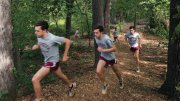Few sports events are more elemental than a footrace. There is little fancy equipment to tweak, and no one else to blame or praise for the results. In the hours and minutes before the starting gun fires, says Daniel Chenoweth ’11--Harvard’s first winner of the Ivy League’s Heptagonal Championship individual crown in cross-country in 15 years--runners ask themselves: “Am I going to be tough enough to do what I need to do to win?”
And then there is the pain.
“That is a distinguishing characteristic of cross-country and track,” says the harriers’ captain, who has been a Harvard standout in both since he belted out the second-fastest 3,ooo-meter time among freshmen nationally in 2008. “There is a certain level of pain in other sports, but you can still have a good game and maybe feel okay,” he explains. In running, “You know that to do your best, it is going to be painful. You need to be ready for that.”
Chenoweth, a sociology concentrator with an interest in architecture and film, doesn’t worry about these things as much as most runners do: “I focus down on the things I can control, making sure I’m ready to go, stretched out, and have enough food and water.” In his first race this fall, he set a new course and meet record at Yale, finishing 25 seconds ahead of his closest competitor. He laid the foundation for speed months earlier, logging 80 to 90 miles a week in the summer to develop a core of endurance. “We put in lots of base training miles, nothing fast, and then slowly transition to faster and harder workouts”--such as regular 400- or 1,000-meter hill runs--as the season approaches, he says. “We want to come back really strong and then get really sharp,” by which he means quick.
The training week begins Sunday with a long run, and ends with a weekend race. Chenoweth credits Jason Saretsky, now in his fifth year as head coach of cross-country and track and field, for taking the mental strain of training off the team. “There’s a lot of trust there,” he says. “Basically, coach is in control” of deciding how to train; the athletes’ job is to “go out and run the workout.” Constant practice pays off, Chenoweth says, because “running fast is a game of efficiency in the end.”
But atop the layers of endurance and biomechanical efficiency that can be built up only with dedication and consistency in practice--a hallmark of Chenoweth’s work ethic--is race strategy. “In races,” he says, “I am completely focused on what is going on”: where his rivals are, whether the terrain changes, how he is feeling--and thinking about when to attack. On a downhill, he may stride faster to gain a little momentum that he can carry through a flat, or take the lead at a corner to avoid being forced to the outside, which adds a yard or two to the total distance. On uphills, he may push the pace a little harder right at the top, in an attempt to drop a competitor. “Even if your strategy is to sit back,” he explains, “you always have to be aware of what is going on at the front, because if a group of runners tries to break off and you want to win the race, you have to be ready--at the college level, they usually aren’t coming back.”
When he won the 3,000-meter race at the track and field Heptagonal Championship his sophomore year, he recalls, “It was an interesting field because some guys were really strong and a couple of guys were really quick.” The challenge in such a situation is that if the front runners are still in a pack approaching the finish line, those with a fast finishing kick will break away over the last few hundred meters to win. But simply running a faster pace throughout the race eliminates the speedsters and benefits the endurance crowd.
He and Saretsky planned to let someone else do the work of leading until about halfway through. Then Chenoweth would “make a break, to get a good gap on some of the guys” who were dangerous near the finish. “That was what I needed from Coach,” he says. In the race, the runners adopted a relatively slow pace at first. When Chenoweth made his move, he “threw down a really fast, hard lap” that opened a gap on the rest of the field. He took the next lap “a little easier” to recover and then “drove hard in to the finish,” and won.
A five-foot-eight, 130-pound Platonic ideal of a runner, Chenoweth hails from Geneseo, Illinois. He took up the sport at the urging of his older brother Brian, who ran for Wartburg College in Iowa. (His parents also run, but only in an occasional road race.) At Harvard, Chenoweth competes nearly year-round: cross country in the fall, and then track--indoors during the winter months and then outdoors in the spring.
As he drives toward the finish of his college career, his personal goal is to make all-American--one of the few honors (awarded to the top 20 or so runners nationally) that has eluded him during the course of a stellar Ivy career. His aspirations for the team he now leads have focused on the Ivy League championships on October 29. Columbia and Princeton have been the teams to beat in the last few years, but Harvard has a quintet of promising freshman talent--and Chenoweth.









